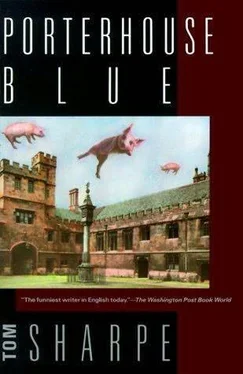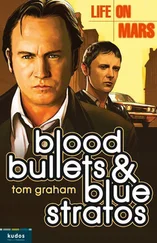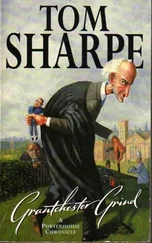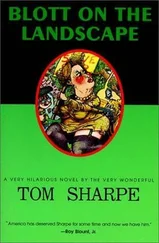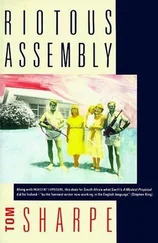“Ten thousand,” said Skullion.
“Ten thousand?” The manager sat down again. He picked up the phone and rang the investment department. “Amalgamated Universal Stores. What’s the current selling price?” There was a pause while the manager studied Skullion with a new incredulous respect. “Twenty five and a half?” He put the phone down and stared at Skullion.
“Mr Skullion,” he said at last, “this may come as something of a shock to you. I don’t quite know how to put it, but you are worth a quarter of a million pounds.”
Skullion heard the words, but they had no visible effect upon him. He sat unmoved upon his chair and stared numbly at the bank manager. It was the manager himself who seemed most affected by the sudden change in Skullion’s status. He laughed nervously and with a slight hysteria.
“I don’t think there’s much doubt that you can make a bid for Rhyder Street now,” he said at last but Skullion wasn’t listening. He was a rich man. It was something he had never dreamed of being.
“There must have been dividends,” said the manager. Skullion nodded. “In the building society.” He got up and put the chair back against the wall. He looked at the shares which represented his fortune. “You’d better put them back into the safe,” he said.
“But…” began the manager. “Now Mr Skullion, sit down and let’s discuss this matter. Rhyder Street? There’s no need to think of Rhyder Street now. We can sell these shares and… or at least some of them and you can purchase a decent property and settle down to a new life.”
Skullion considered the suggestion. “I don’t want a new life.” he said grimly, “I want my old one back.”
He left the manager standing behind his desk and went out into Sydney Street. In his office the bank manager sat down, his mind crowded with cheap images of wealth, cruises and cars and bright suburban bungalows, ideas he had thought disreputable before. To Skullion, standing on the pavement, such things meant nothing. He was a rich man and the knowledge did nothing to ease his resentment. If anything it increased it. He had been cheated somehow. Cheated by his own ignorance and the loyalty he had given Porterhouse. The Master, the Dean, even General Sir Cathcart D’Eath, were the legatees of his new bitterness. They had misused him. He was free now, without the fear of dismissal or unemployment to mitigate his hatred. He went down Green Street towards the Blue Boar.
During the next two days Cornelius Carrington was intensely busy. His dapper figure trotted across lawns and up staircases with a retinue of cameramen and assistants. Corners of Porterhouse that had remained obscure for centuries were suddenly illuminated by the brightest of lights as Carrington adorned his commentary with architectural trimmings. Everyone cooperated. Even the Dean, convinced that he was heaping coals of fire on the Master’s head, consented to discuss the need for conservatism in the intellectual climate of the present day. Standing beneath a portrait of Bishop Firebrace, Master 1545-52, who had, as Carrington was at some pains to point out in his added commentary, played a notable role in suppressing Kett’s Rebellion, the Dean launched into a ferocious attack on permissive youth and extolled the celibacy of previous generations of undergraduates. In contrast, the Chaplain was driven to admit that what many supposed to have been a nunnery before it was burnt down in 1541 had in fact been a brothel during the fifteenth century. The camera dwelt at length on foundations of the “nunnery” still visible in parts in the Fellows’ Garden while Carrington expressed surprise that a college like Porterhouse should have allowed such sexual laxity so many centuries before. The Senior Tutor was filmed cycling along the towpath by Fen Ditton coaching an eight, and was then interviewed in Hall on the dietary requirements of athletes. Carrington wheedled out of him the fact that the annual Feast cost over £2,000 and then went on to ask if the College made any contribution to Oxfam. At this point, forgetful of his electronic audience, the Senior Tutor told him to mind his own business and stalked out of the Hall trailing the broken lead of his throat microphone. Sir Godber was treated more gently. He was allowed to stroll across New Court and through the Screens discoursing on the need for a progressive and humanitarian role for Porterhouse. Pausing to look far-sightedly across the thirty feet that separated him from the end wall of the library, the Master spoke of the emotional-intellectual symbiosis that was a part of university experience, he lowered his head and addressed a crocus on the catharsis of sexual union, he raised his eyes to a fifteenth-century chimney and esteemed the compassion of the young, their energetic concern and the rightness of their revulsion at the outmoded traditions that… He waxed eloquent on meaningful relationships and urged the abolition of exams. Above all he praised youth. The elderly, by which he evidently meant anyone over thirty-five, must not stand in the way of young men and women whose minds and bodies were open… Even Sir Godber faltered at this point and Carrington steered him back to the subject of social compassion, which he saw as the true benefit of a university education. The Master agreed that a sense of social justice was indeed the hallmark of the educated mind. Carrington stopped the cameras and Sir Godber made his way back to the Master’s Lodge, certain that he had ended on the right note. Carrington thought so too. While his cameramen took close-ups of the heraldic beasts on the front of the main gate and panned along the spikes that guarded the back wall, Carrington drove over to Rhyder Street and spent an hour closeted with Skullion. “All I want you to do is to come back to the College and talk about your life as Head Porter,” he told him. Skullion shook his head. Carrington tried again. “We’ll take some shots of you outside the main gate and then you can stand in the street and I’ll ask you a few questions. You don’t have to go into the College itself.” Skullion remained adamant.
“You’ll do me in London or you won’t do me at all,” he insisted.
“In London?”
“Haven’t been to London for thirteen years,” said Skullion.
“We can take you up to London for a day if you like but it would be much better if we filmed the interview here. We can do it here in your own home.” Carrington looked round the dingy kitchen approvingly. It had just that element of pathos he required.
“Wouldn’t look good,” said Skullion. Under his breath Carrington cursed the old fool.
“I’m not having myself on film either,” Skullion continued.
“Not having yourself on film?”
“I want to go out live,” said Skullion.
“Live?”
“In a studio. Like they do on Panorama . Always wanted to see what it was like in a studio,” Skullion went on. “It’s more natural, isn’t it?”
“No,” said Carrington, “it’s extremely unnatural. It’s hot and you have large cameras…”
“That’s the way I want it,” Skullion said, “I’m not doing it any other way. Live.”
“All right,” Carrington said finally, “if you insist. We’ll have to rehearse it first, of course. I’ll put questions to you and you’ll reply. We’ll run through it so that there aren’t any mistakes.” He left the house in some annoyance, troubled by Skullion’s persistence and conscious that without Skullion the programme would lack dramatic impact. If Skullion wanted to go to London and if, in his superstitious way, he objected to being “put on film” he would have to be placated. In the meantime the cameramen could film Rhyder Street and at least the exterior of the Head Porter’s home. He drove back to Porterhouse and collected the camera crew. Only one interview left now, that with General Sir Cathcart D’Eath at Coft Castle.
Читать дальше
